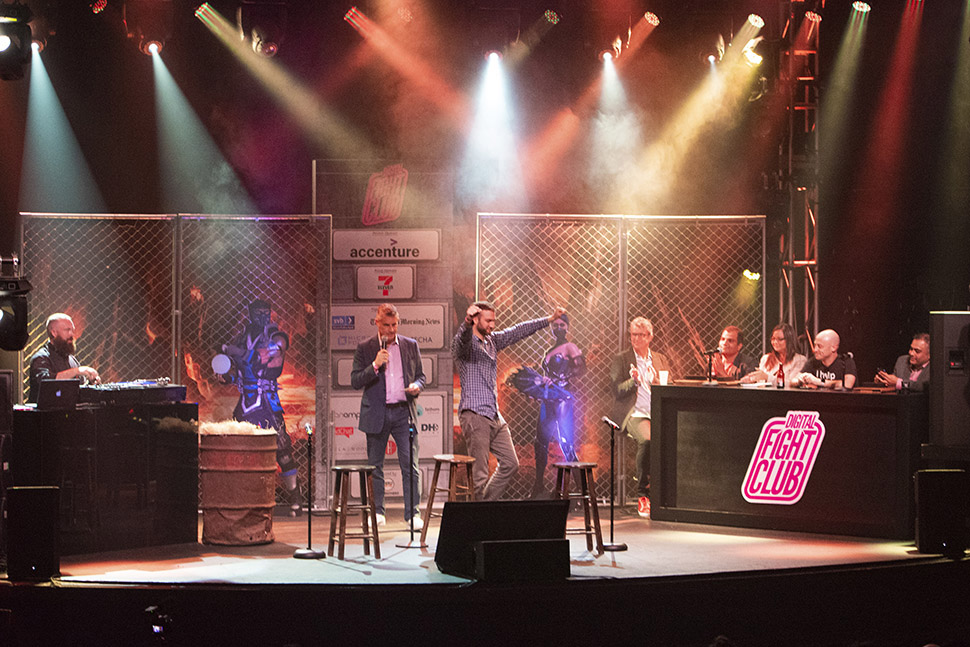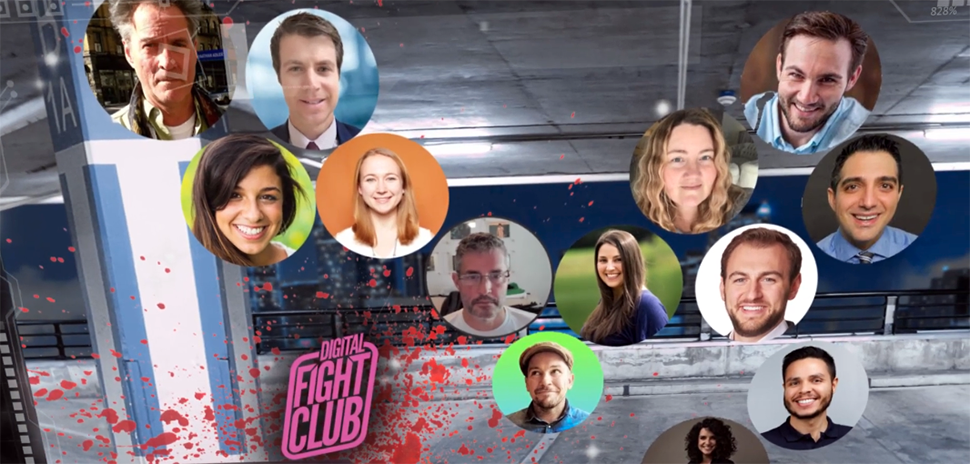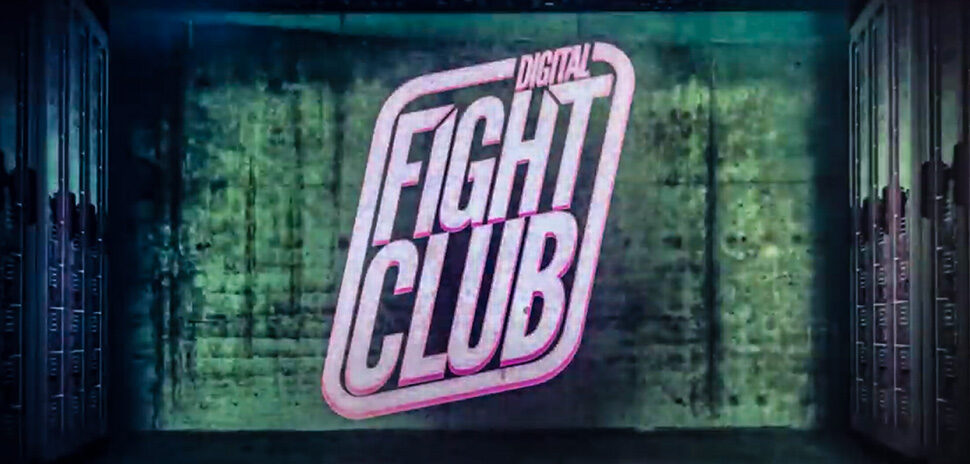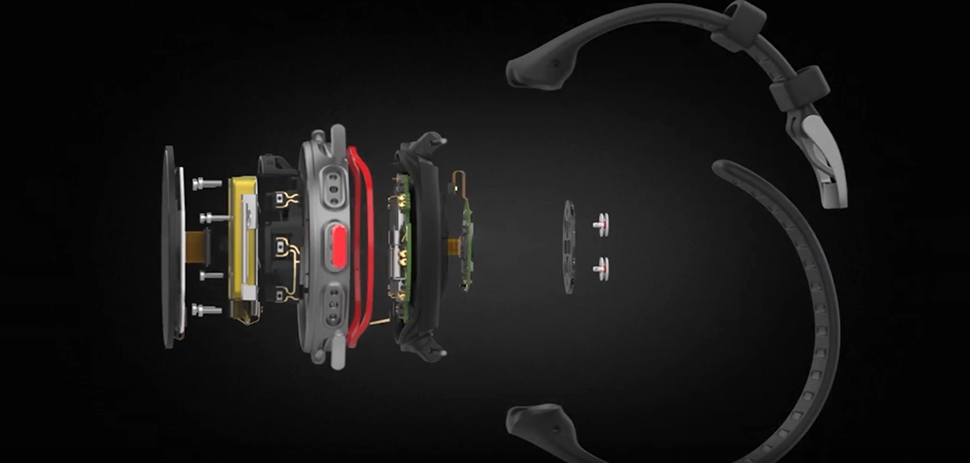The crowd was electric at Dallas’ fourth annual Digital Fight Club, a no-holds-barred metaphorical “fight” that pits two technology gurus against each other. It could’ve been the cocktails, the networking, or founder and event host Michael Pratt’s scintillating commentary. But, most likely, it was the building anticipation of getting to see some of DFW’s most established experts battle it out on the most current hot-button topics.
The original Digital Fight Club was created by Digital Dallas, an organization Pratt founded some 10 years ago to bolster the entrepreneurial community in North Texas. Fight Club itself was born from beers between Pratt, who’s also the CEO of Panamplify, and Andrew Hopkins, the managing director of Industry X.0 at Accenture. The duo came to the notion that panels are boring—rather, experts should be matched in a raucous technology-driven debate.
READ NEXT The Untold Story of How Digital Fight Club Came to Be
Two designated “fighters” sit face-to-face in a makeshift boxing ring for five separate 10-minute rounds. Each round hosts a niche topic—pulled from the Accenture Interactive Trends Book—relating to the fighters’ areas of expertise, and it’s up to them to defend their stance.
Both fighters get a 45-second opening and a 30-second rebuttal. Then, two questions (the second of which is a “jump ball”) can be asked among the five referees with a 15-second response from each fighter. The refs and the audience then cast their votes via mobile device. Pratt sits between the fighters to play both commentator and moderator, ensuring fighters stick to the time limit while also encouraging they pull no punches.
“There’s a lot of tension between fighters at Fight Club, I promise you,” Pratt said. “I can feel it onstage.”
This year’s Digital Fight Club, powered by Accenture, was held on Aug. 28 at The Granada Theater on Greenville Avenue in East Dallas. Irving-based 7-Eleven was the ring sponsor (there was even a Slurpee truck outside), and Stratecha, Silicon Valley Bank, Micro Focus, and The Dallas Morning News were fight sponsors. Dallas Innovates was the media sponsor.
In his opening, Pratt announced that Digital Fight Club was heading to Houston for the first time ever, following a debut in Boston last year. Also, at the end of February, Pratt and his team are going to host a marketing-esque Fight Club, where brands and agencies participate.
Another first for this year’s event was that it was live-streamed on Facebook.
Onstage with Pratt sat the referees: Nick Reddy, CDO of Baylor Scott & White; Joshua Baer, CEO of Capital Factory; Tarang Sethia, VP of Product at 7-Eleven; Syya Yasotornrat, podcast host of Innovation Calling; and Hopkins, the head referee.
Dallas Innovates was there for every raucous debate and technology clash. See who came out on top.
All photos by Michael Samples.
Public Transport Technology: Taming the Wild West
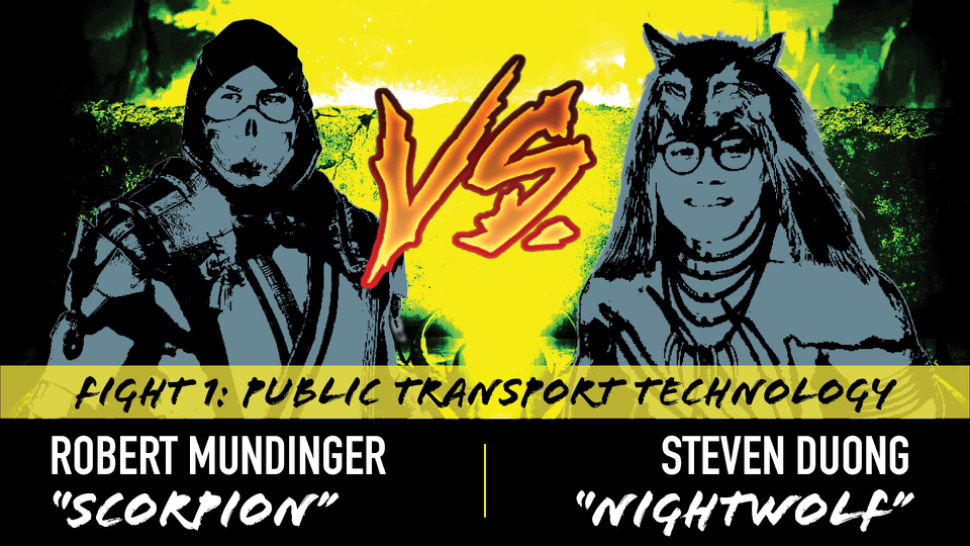
Digital Fight Club’s Fight #1 featured Robert Mundinger, founder of TheMap.io, versus Steven Duong, associate vice president of AECOM’s Design + Planning and Economics, as the Fighters.
Since a surplus of scooter and bike companies decided to join Uber and Lyft in the public transportation sphere, there’s been some controversy. In a cities-versus-companies-type match, the problem of insufficient regulation and urban planning was discussed, along with its effect on the public. Pratt said if you’re torn between liking the convenience but hating the mess on your corner, that’s what this is about.
Duong sees the Wild West as an appropriate name for the fight because he thinks tech companies look at transportation like the Wild West. New territory can be explored every day. But the tech companies tend to forget that exploration is also “really chaotic, disorderly, and dangerous,” and on any given day, you could get ‘shot,’ i.e. “hit by an electric scooter.”
“We’re making improvements. We’re trying to change and improve digestion,” Duong said. “And then the tech companies are coming in and saying, ‘Hey, we can solve this problem.’ But they don’t even know what questions to ask you.”
Mundinger responded with a few questions to the audience: “So, who here has been hit by a scooter? And who Ubered here tonight?”
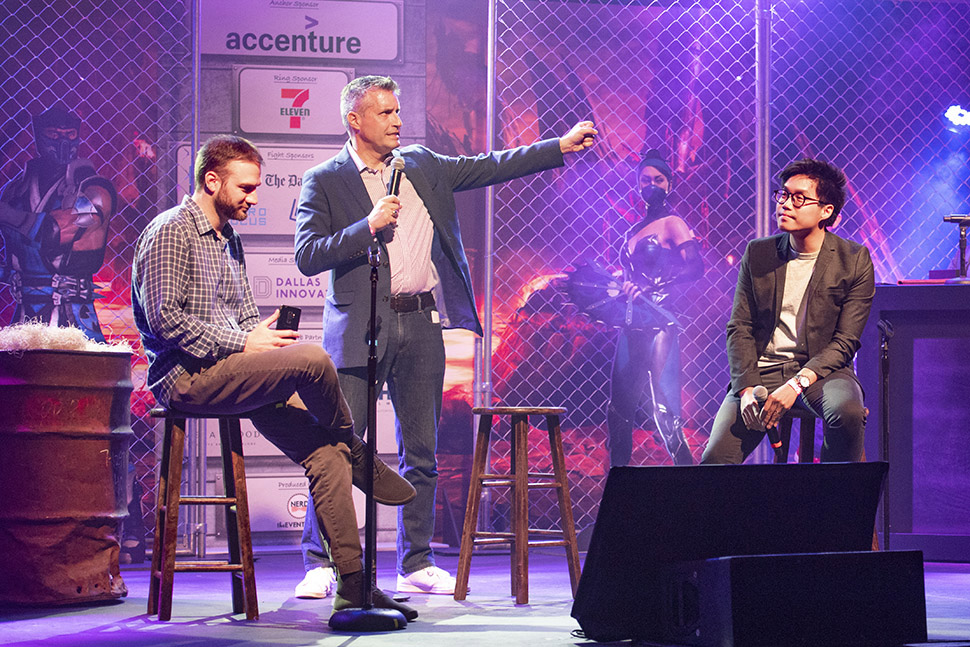
He said the U.S. has never seen the commercial transportation innovations quite like what happened in the 1960s. We still apply the same lanes and drive the same cars. So to him, what’s about to happen is crazy, interesting, and exciting, and “cities need to be ready for it.”
But to Duong, tech companies tend to just put a bandaid on the situation with mediocre solutions like using social media. “People have been doing this since the beginning of time,” he said. “So have things really changed and have these technology companies really advanced anything?” (That was met with some Ooos from the crowd.)
Mundinger replied that transportation has the potential to be much safer than any other trends coming out.
“Over 3,000 people die a year on Texas streets. That’s double the amount of people that are murdered,” he said. “So I think that cities need to innovate and accept this technology otherwise.”
Winner: Robert Mundinger with 58%.
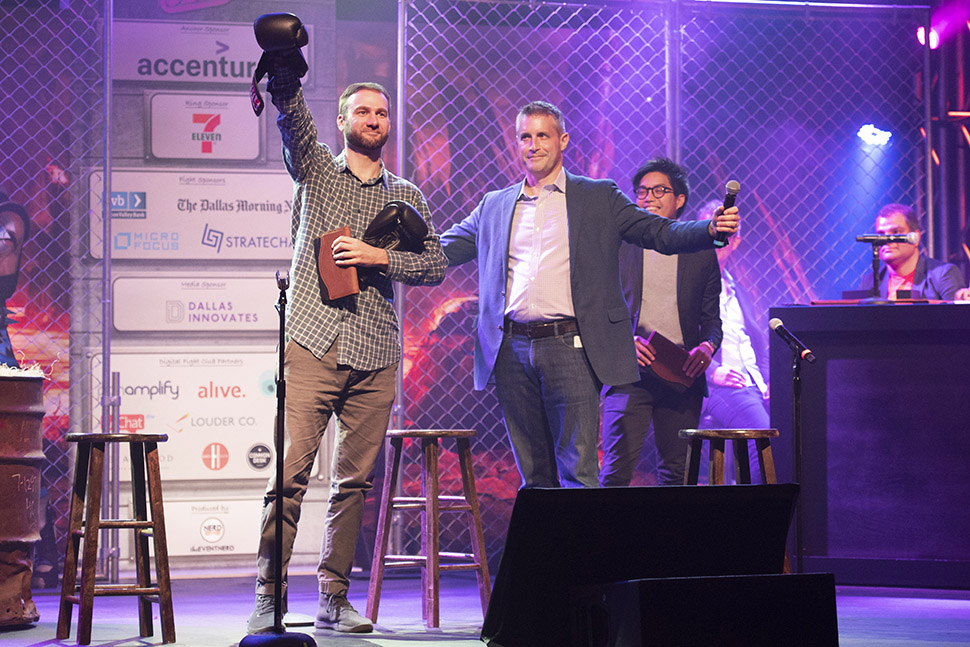
Secure Me: Digital Safety Across the Ecosystem

The Fighters for Digital Fight Club’s second Fight are Lee Harrison, CEO of Thru, versus Stephen Ellis, CTO of Plymouth AI.
In order to have services that are expected in society like Google, Facebook, Uber, and Favor, data has to be shared between each platform. But while it can make for wonderful experiences, the data is about us. This fight battled it out about sharing and security, and whether or not we should allow our data to be passed around like Halloween candy.
Ellis started it off by asking the audience to picture today’s consumer landscape like it’s the savanna in Africa. But the consumer is the gazelle. Right now, that gazelle is facing many challenges. On one side are the ‘lions’ that would love to eat them (“bad actors and various companies, Facebook”), and on the other are farmers who herd them (“but we don’t really know where they’re coming from”).
“It is up to the gazelles to defend themselves,” Ellis said. “And right now, they are massively ill-equipped to do so.”
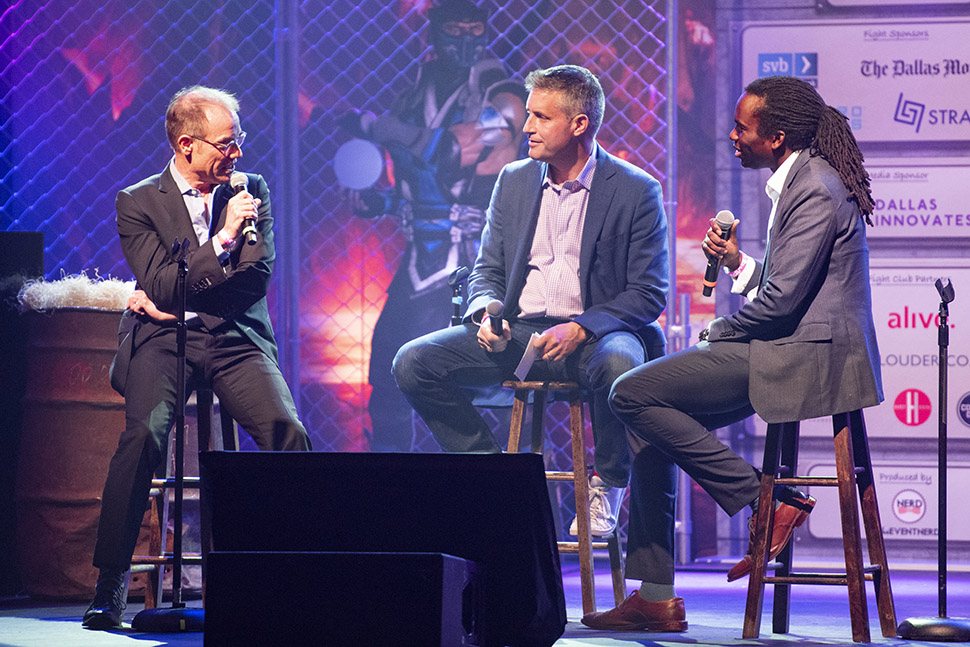
Harrison said that since most people in the audience are on social platforms, there’s no way they can defend themselves. If you put something out in the public forum, it’s out there forever.
“You’re never going to be able to pull it back. You’re never gonna be able to do anything about it. You can’t recover once you put it on there,” he said. “If you want to see the top of your house or your street, just look at Google. What are you going to do, put a tent over your house?”
Ellis said that while yes, we can’t govern the companies, we as consumers can vote. The reason we have government and representatives should be to work with technology to mitigate some of the effects of runaway companies.
“I don’t think there’s any way people are going to leave Facebook anytime soon. It seems to be an addiction,” Harrison responded. “They figured out how to keep you and keep you going.”
Winner: Stephen Ellis with 78%.
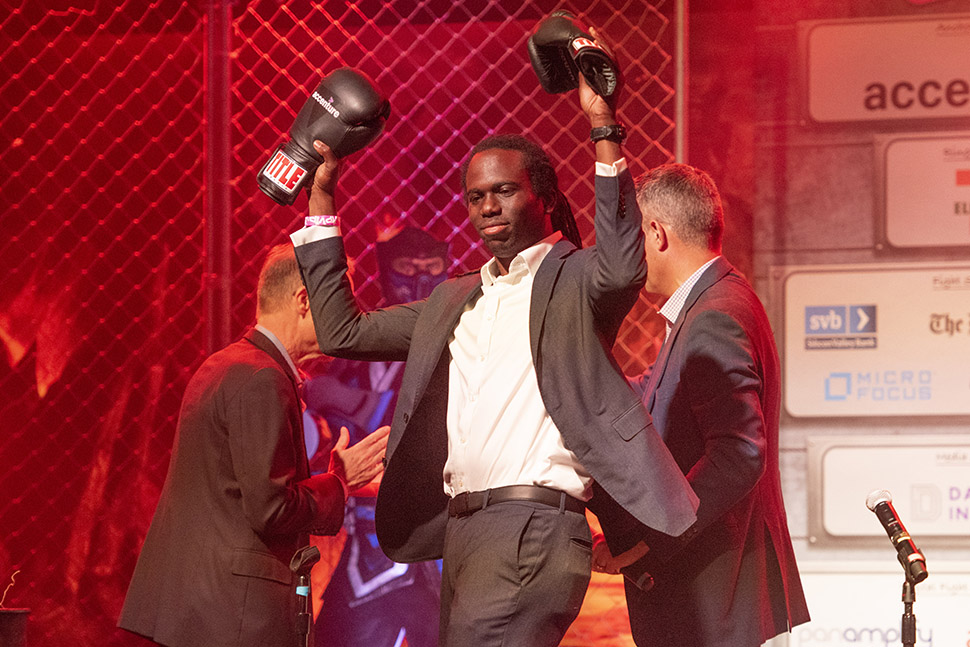
Silence: To Digitally Disconnect or Not

Meet the Fighters for the third round of Digital Fight Club: Jennifer Zientz, head of clinical services at the Center for BrainHealth, versus Michelle Adams, founder and president at Marketing Brainology.
The third round made history, as it was the first time two women went head-to-head in the ring.
The fight took a turn from the typical topics, because rather than look at technology’s viability or impact, it examined the use of technology in the first place. Both women are on polar opposite sides of how technology can affect your brain, performance, and overall health. Afterwards, Pratt and Hopkins agreed it was the best battle in Digital Fight Club’s history.
Zientz started it off with a scary statement to the audience: “More than 50 percent of what each and every single one of you does on a daily basis is toxic to your brain health and to your brain performance.” One of the leading contributors to that, she said, is technology.
Zientz said she isn’t bashing technology, but most people are actually a slave to their phone, computer, iPad, or whatever their preferred device is, rather than being in control of it. “That is a fundamental problem that we have,” she said, “and it is wrecking chaos on our brains.”

Jennifer Zientz
Adams actually agreed with Zientz, saying that research does show that she’s right. But in her lab at Marketing Brainology, she and her team have been doing tests that also show the opposite.
“One would be surprised at how little our brain activates while thumbing down our Instagram,” she said. “As human beings, we’ve actually evolved—we’ve been able to tune out more than we tune in.”
She said there’s always novelty in the beginning, like with a new app. She mentioned fantasy football (met with cheers from the audience), saying that showed a lot of activity and stimulation. But Instagram, not so much. Our brains are adapting and moving forward with technology.
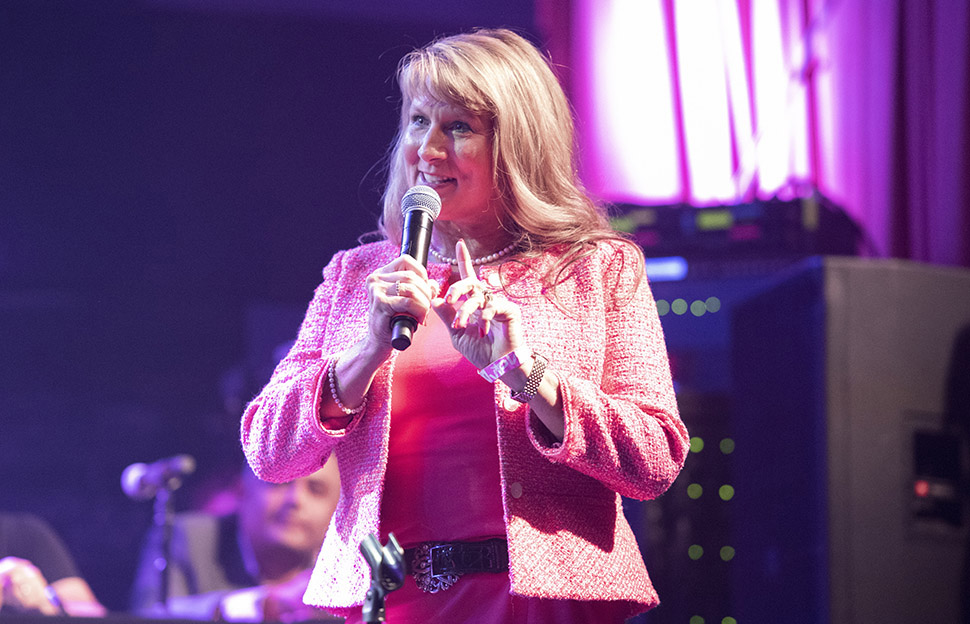
Michelle Adams
Zientz said there’s little activation, because there’s no real effort required. Your brain rewires to the things that it does all the time.
“Do you want to rewire it to low effort?” Zientz posed to the crowd. “Do you want to make it efficient in higher order thinking, Or do you want it to be completely dependent on technology for your answers and your deeper level thinking?”
“Actually”—Adams said over the riled-up audience—”our brains can help us.”
She pointed to the iOS Health app, Headspace, and Ring, which are all helpful tools delivered through your device. With mobile applications, you can do anything from learn how to meditate to check-in on your elderly parents while they’re cooking in the kitchen.
Winner: Jennifer Zientz with 91%.
Synthetic Reality: Does Real Even Matter?
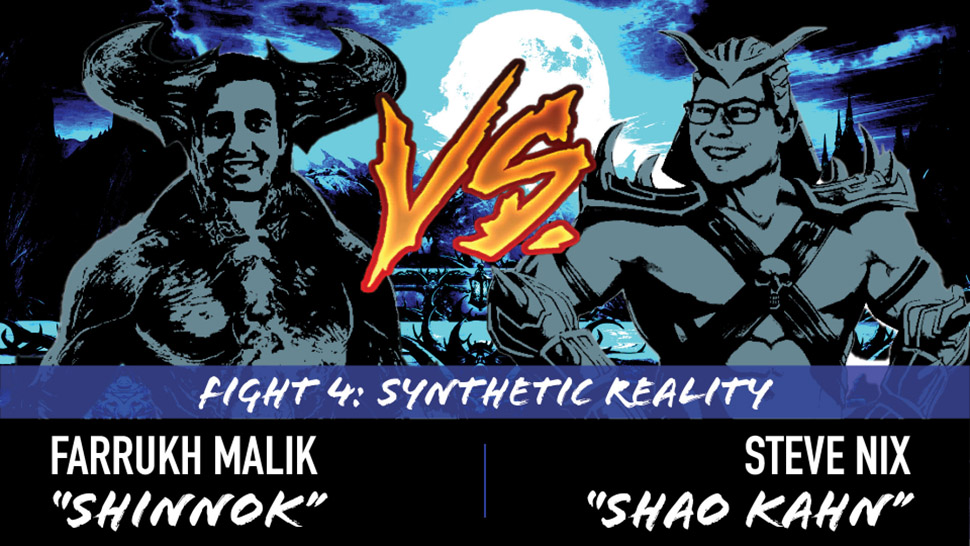
For Fight #4 of Digital Fight Club, Farrukh Malik, CEO of Roomored, went up against Steve Nix, CEO of ForwardXP.
This one was on synthetic reality. Not virtual or augmented, but synthetic, which deals with what we, as humans, perceive as real, whether it is or not. But, does real even matter anymore? And what are the ramifications?
“So, does real even matter? Of course it does,” Malik said, kicking things off. “We don’t live in the matrix, and I hope we never do.”
He said that synthetic reality is enabling us to do so many cool things in the real world, such is the case with his job at Roomored. He creates synthetic virtual environments to sell real products that have never been sold online like countertops or tiling. There’s a number of other industries doing similar things, which allows the public to have more free time to do exciting things—”reduce wastage, save environment, make the world a better place.”
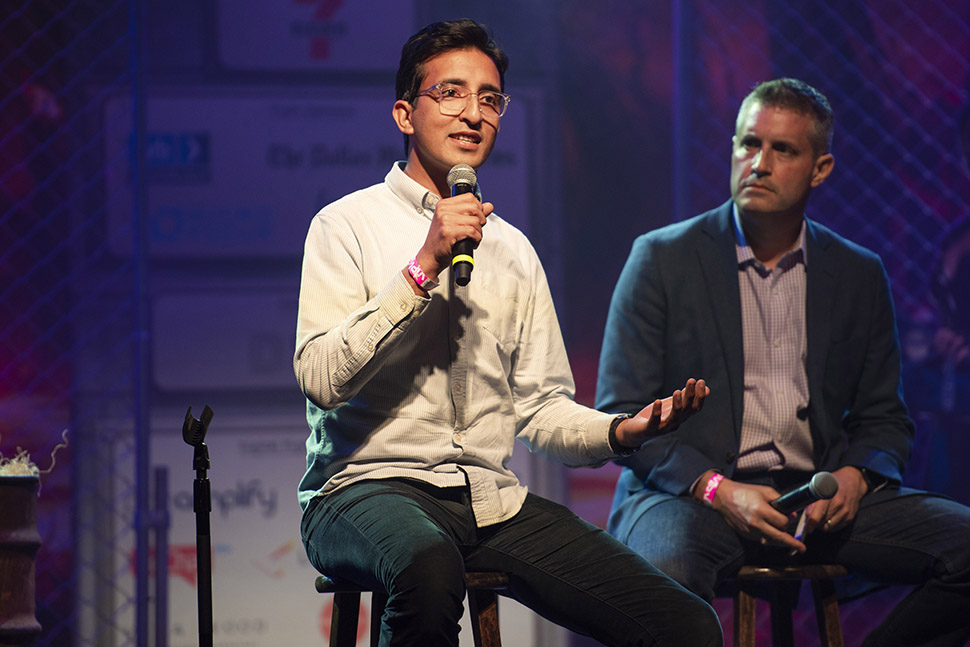
“But the thing is,” Nix replied, “synthetic reality is already having an outsized impact on our human experience in everything from video games to digital celebrities.”
He pointed to kids these days who spend hours watching other people play video games rather than consuming traditional media, and virtual pop stars who have hundreds of millions of YouTube views.
Malik answered with the “bad actresses” of the synthetic reality world: deep fakes. “Seeing is believing,” he said. “That wouldn’t be true anymore if we don’t control what’s going on.”
Nix stepped backward to 1988 with a little program invented that many are familiar with today called Photoshop. By the early 90s, your crazy uncle was probably forwarding outlandish pictures, which were obviously completely fake. Fast-forward, and Snopes had to be invented.
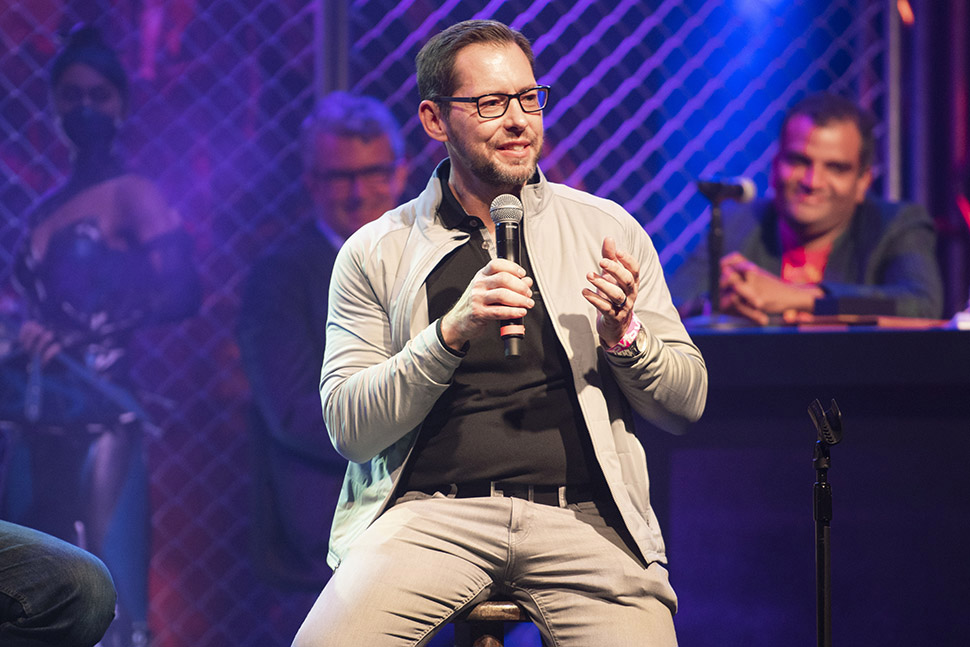
“Most of us in this room, and people throughout the country, are savvy enough to know a fake photo from a non-fake photo,” he said.”While there’s going to be a learning curve, there’s a lot of incredible technology to drive deep fakes. But it’s going to take people studying and learning and realizing maybe just because somebody said that on a video, doesn’t mean that it’s real.”
Winner: Farrukh Malik with 57%.
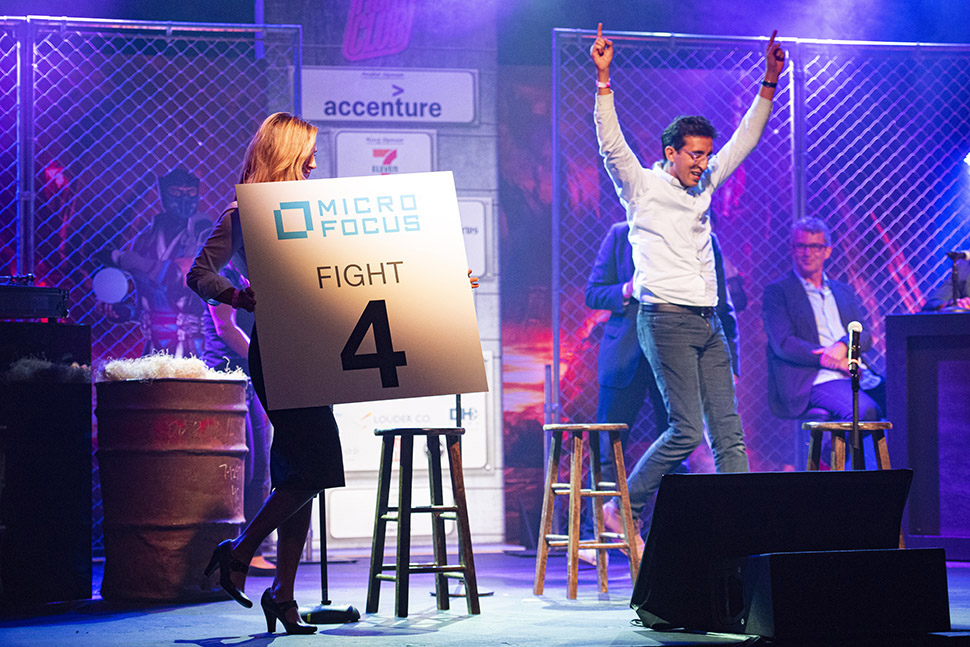
Get to Know Me: Data, Personalization, and Privacy

Fight #5 of Digital Fight Club put Andy Chen, SVP of +1 Labs at Match Group, and Mike Orren, chief product officer at The Dallas Morning News and president at Belo Business Intelligence, against each other.
The last fight was on a topic that Pratt said is “near and dear to everyone’s heart”: personal data and privacy. This topic posed the question of whether or not to find peace with the tension of privacy rights or let companies drive experiences with consumer data. It’s a sensitive topic.
Orren launched the conversation by saying that the problem people have with privacy isn’t that it’s being abused, it’s more about how customization isn’t good enough. He points out the face app that took social media by storm a few weeks ago when everyone decided it would be funny to make themselves look older. It was revealed that a sketchy Russian company was using the data from that app poorly—and usage went up.
“We want what we want, we want utility,” Orren said. “That’s where businesses should be focusing, and the privacy angle will take care of itself along that way.”
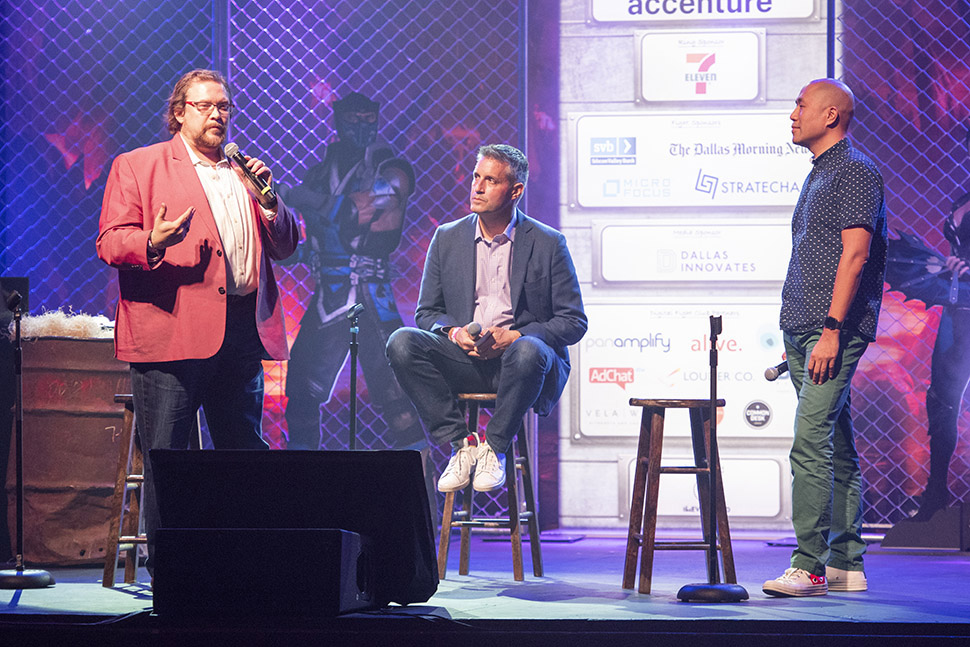
Fight #5: Get to Know Me: Data, Personalization & Privacy
But, Chen responded, that privacy is being used. He said in the last year, Google, Facebook, Cambridge Analytica, and Experian have all been sued and fined by the government because they violated the privacy rights of their customers. We’re about to go into the big game of digital information, and we don’t have the data privacy laws to back it up.
“It’s about digital wearable products that are taking bio information from you. It’s about cameras out there that have face detection. It’s about active listening devices that can actually detect your voice signature,” he said. “So when you ask me, is data secure? We’re just getting started.”
In Orren’s opinion, privacy laws are taking away the ability of digital businesses to engage with their customers in a way that customers have shown they want to engage.
Chen said he’s not referring to the technologies in place today. Rather, he’s worried about the dollars being poured into AI and deep thinking, which we don’t yet have legislation and privacy policies over.
Winner: Andy Chen with 81%.
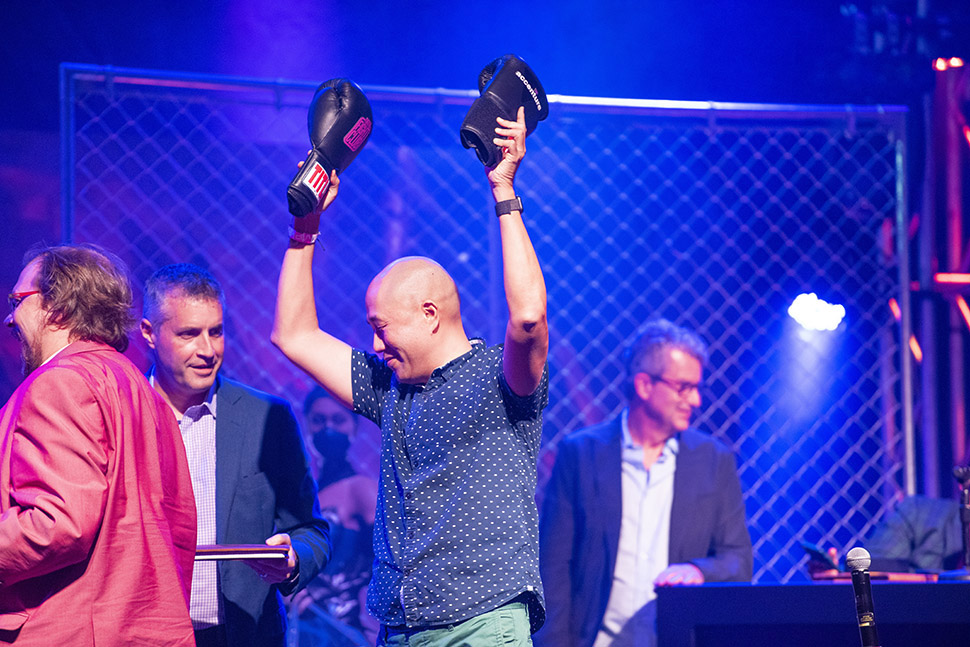
Find Your Face @DFC2019
Want to find your face in the crowd? Check out the GigaPixel 360-degree photo. If you tagged yourself in the photo by midnight on Friday, Aug. 30, you could win the vintage ’80s Mortal Kombat arcade that was at the event.
Go here for how that works: Take a (Much) Closer Look at Digital Fight Club 2019 with DHD Films’ Gigapixel Photos
Dallas Innovates is the media sponsor for Digital Fight Club 2019.
![]()
Get on the list.
Dallas Innovates, every day.
Sign up to keep your eye on what’s new and next in Dallas-Fort Worth, every day.










